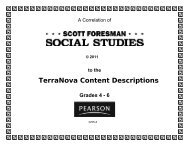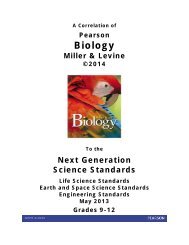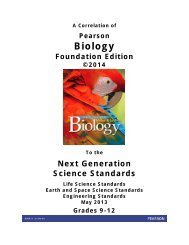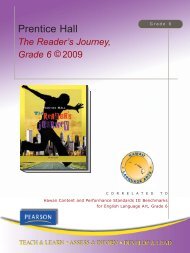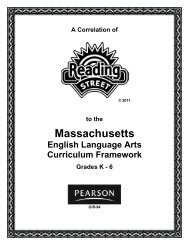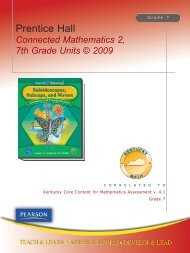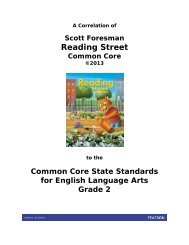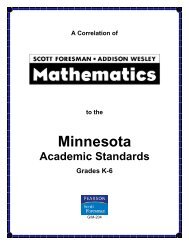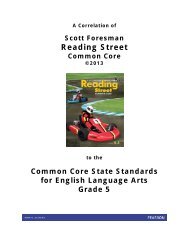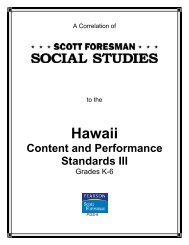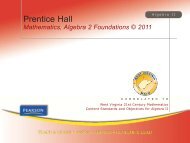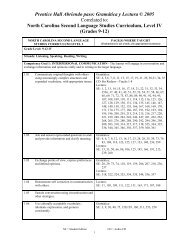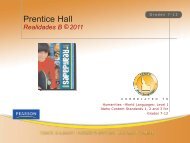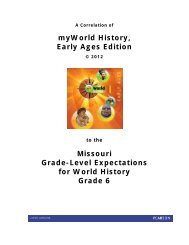Prentice Hall Science Explorer â 16 Book Series © 2009 ... - Pearson
Prentice Hall Science Explorer â 16 Book Series © 2009 ... - Pearson
Prentice Hall Science Explorer â 16 Book Series © 2009 ... - Pearson
You also want an ePaper? Increase the reach of your titles
YUMPU automatically turns print PDFs into web optimized ePapers that Google loves.
<strong>Prentice</strong> <strong>Hall</strong> <strong>Science</strong> <strong>Explorer</strong> – <strong>16</strong> <strong>Book</strong> <strong>Series</strong> © <strong>2009</strong><br />
Correlated to:<br />
Connecticut Core <strong>Science</strong> - Content Standards and Expected Performances<br />
(Grades 6-8)<br />
CONNECTICUT CORE SCIENCE - CONTENT<br />
STANDARDS AND EXPECTED<br />
PERFORMANCES<br />
C27. Describe how genetic information is<br />
organized in genes on chromosomes, and<br />
explain sex determination in humans.<br />
PAGE(S) WHERE TAUGHT<br />
(If submission is not a text, cite<br />
appropriate resource(s))<br />
Human Biology and Health<br />
SE/TE: 214-223, 224-231, 232-245; At Home<br />
Activity: 240; Discover Activity: 2<strong>16</strong>, 224,<br />
232; Key Terms: 2<strong>16</strong>, 224, 232; Math<br />
Analyzing Data: 230; Skill Activity: 218, 229,<br />
235; Skill Lab: 241; Target Reading Skills:<br />
2<strong>16</strong>, 224, 232; Writing in <strong>Science</strong>: 221, 231<br />
Gravity is the force that governs the motions<br />
of objects in the solar system.<br />
TE: Address Misconceptions: 214F, 230, 238;<br />
Build Inquiry: 219, 227, 236, 239;<br />
Differentiated Instruction: 217, 220, 225,<br />
228, 237, 38; Monitor Progress: 217, 219,<br />
221, 225, 229, 231, 233, 235, 237, 240;<br />
Performance Assessment: 221, 231, 240;<br />
Teach Key Concept: 217, 218, 220, 225, 226,<br />
228, 229, 233, 238; Teacher Demo: 235; Use<br />
Visuals: 237<br />
Content Standards<br />
Earth in the Solar System – How does the position of Earth in the solar system affect<br />
conditions on our planet<br />
8.3 - The solar system is composed of planets and other objects that orbit the sun.<br />
Astronomy<br />
SE/TE: <strong>16</strong>-19, 26-27, 42, 59, 136-140; At<br />
Home Activity: 27; Discover Activity: <strong>16</strong>,<br />
136; Key Terms: <strong>16</strong>, 136; Math Analyzing<br />
Data: 18; Target Reading Skills: <strong>16</strong>, 136; Try<br />
This Activity: 42; Writing in <strong>Science</strong>: 19, 140<br />
TE: Address Misconceptions: 139;<br />
Differentiated Instruction: 17, 59, 137, 139;<br />
Monitor Progress: 17, 19, 27, 59, 137, 140;<br />
Performance Assessment: 140; Teach Key<br />
Concept: 17, 26, 42, 59, 137, 138; Teacher<br />
Demo: 19, 26, 138; Use Visuals: 139<br />
47<br />
SE = Student Edition - TE = Teacher Edition



